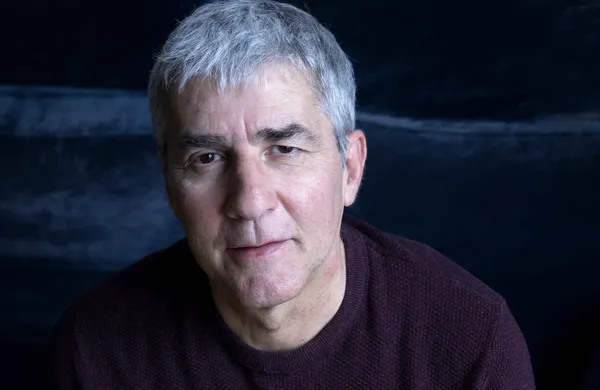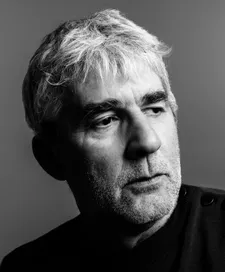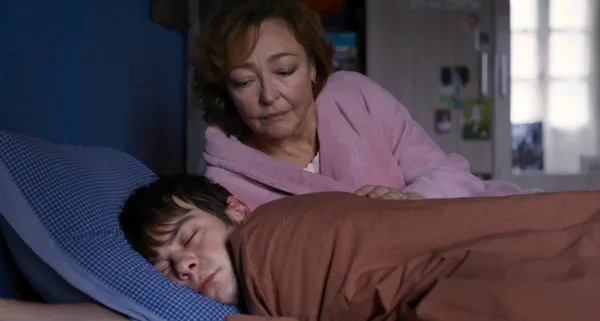 |
| Misericordia director Alain Guiraudie: 'A film is a mixture of a lot of things including my own personal fantasies, and some fairly intimate feelings' Photo: Films du Losange |
Over the last 35 years proudly queer director Alain Giraudie has carved out his own idiosyncratic place in French cinema. Most of his films take place outdoors and feel close to Nature, perhaps understandable given his rural roots. He was born 60 years ago in Villefranche-de-Rouergue in Aveyron in the Midi-Pyrenées region, renowned for its diverse landscapes and historic buildings.
His own village was not unlike the locale for his new film Misericordia but he baulked at the idea of shooting on his home turf and instead chose Saint-Martial in the Cévennes national park about 100 kilometres from where he was born. He was attracted to what he describes as its “fairy-tale quality” with hills and forests and houses clustered around the church.
When he discovered the place just before the Covid lockdown it had an abandoned air with houses in disrepair, For Sale signs proliferating and the bakery closed. When he went back to start filming the atmosphere had changed and new inhabitants had moved in. “We had to go around and put up For Sale signs for authenticity - there seems to have been a return to the country of way of life. I suppose the portrait of the village in the film is based on the nostalgia for the place where I grew up in the Seventies,” he says in his heavily accented south of France vernacular. “The priest was a central figure in the village and each village had its priest as well as a baker and a cafe. Now a lot of that has disappeared.”
 |
| Alain Guiraudie photographed by Marie Rouge for UniFrance: 'I like to play around with the idea of desire because like death it is surrounded in mystery' Photo: Marie Rouge/UniFrance |
Giraudie began telling stories by writing novels - some of them unfinished and unpublished - as a first step to a film narrative. “Film scripts seemed too far away from what I thought I was capable of achieving. Now, most of my scripts come from my own novels - even those that have not been published. With a book you can put things in focus much more easily.”
His first short film, Heroes Never Die, was released 35 years ago. Guiraudie has gradually built a reputation as a singular and inquisitive talent. He released two medium-length films, Sunshine For The Poor and That Old Dream That Moves in 2001, the latter of which earned the praise of Jean-Luc Godard when it screened at the Cannes Film Festival. His first full length feature, No Rest For The Brave, in 2003, was as genre-busting coming of age saga set in a universe where the boundaries between dreams, nightmares and reality are hard to distinguish.
It wasn’t until 2013’s Stranger By The Lake, however, that he attracted widespread international acclaim for a fascinating mix of thriller, comedy, explicit sex and escalating terror, which won two awards at the Cannes Film Festival - for best director in Un Certain Regard and the Queer Palm. In 2016, Staying Vertical (about Damien Bonnard’s drifting screenwriter struggling to raise a child) was part of the official selection at the Cannes Film Festival. In 2022, his film Nobody’s Hero, a comedy featuring Noémie Lvovsky and Jean-Charles Clichet and set against the backdrop of terrorist attacks, opened the Panorama section at the Berlin Film Festival.
With Misericordia he feels that he is gaining more kudos in the various aspects of cinema. “I sense I am better at finding the right cast and also I have improved on the editing side. I am gradually refining my techniques and I believe that my films are definitely better today than when I started out,” he said without a hint of false modesty. He agrees with director Maurice Pialat who once said that there was no such thing as progress in art. “The art of the 18th century is no better or worse than the art of today,” added Giraudie.
He takes satisfaction the in the way the film almost took on its own form which he had not realised at the time of writing. He explained: “There are a lot of questions posed by the various characters, but very few answers. I think that allows the audience to make up their own stories as a result of the questions. I gave a minimum of indications in the script about the background and where the characters were going, which almost forces the characters to invent their own threads of narrative. Even during the editing we ended up taking out parts which gave away too much information. And slowly it became clear that the film worked better with a minimum of clues.”
 |
| Bedtime story: Catherine Frot and Félix Kysyl in Misericordia Photo: UniFrance |
All the elements for which he has carved a niche - desire, love, sex, guilt and death - intermingle to arresting effect in a tale of a young man at a crossroads in his life (played by Félix Kysyl) who returns to his village from Toulouse after the death of a man who was once his mentor in the bakery business. His arrival sparks unexpected emotions among the populace, not least the priest and the baker’s widow as well as friends from his youth.
Pressed for his favourite character in the film and Guiraudie opts for the figure of the priest. “Yet I feel there is a bit of me in lots of the characters I create. The priest has a lot of speeches to deliver and he says a lot of things. I am able to say a lot of things through him. But there is a lot of me in the character of Jérémie as well.
“A film is a mixture of a lot of things including my own personal fantasies, and some fairly intimate feelings, and also the sum total of things I have seen or read. I have read a lot Christian mythology which is very present in the film. I am not a Christian and I don’t believe in God, but even so I was raised as a Christian, I was baptised and the priest was a significant figure in the village where I grew up.
“Thereafter I was also influenced by Aztec tragedies and Greek tragedies and mythology. I’m attracted to all the trappings of religion that you find, for example, in Rome. So little by little the priest became a central figure. And I was also intrigued by the notion that over the centuries the priesthood was seen as refuge for homosexuals because legitimately they were not expected to get married.
“I like to play around with the idea of desire because like death it is surrounded in mystery. And the driving force of cinema at its base (and art in general) is mystery. I was also toying with the tendency these days to become more and more puritanical - and also there is less mixing between generations and I wanted to break down those preconceptions.”
After its premiere at the Cannes Film Festival last year away from the glare of the Competition the film gradually has built momentum. Some reactions have surprised Guiraudie, notably comparisons by some observers to Pier Paolo Pasolini’s Theorem with Terence Stamp as the young man sleeping with everyone in a bourgeois household. “In Misericordia the young man doesn’t actually sleep with anyone. Yes, he is in bed with the priest but he doesn’t actually want to sleep with him. And the milieu in Pasolini’s was very bourgeois whereas in my film they are country folk - the widow of the village baker is hardly bourgeois. In fact the more I think about it the more I believe that my film is the opposite of Theorem.”
Misericordia is now on selected release in the States (Sideshow/Janus Films) and in the UK and Ireland (New Wave) from 28 March. Richard Mowe talked to Alain Guiraudie at the UniFrance Rendezvous with French Cinema in Paris earlier in the year.





















